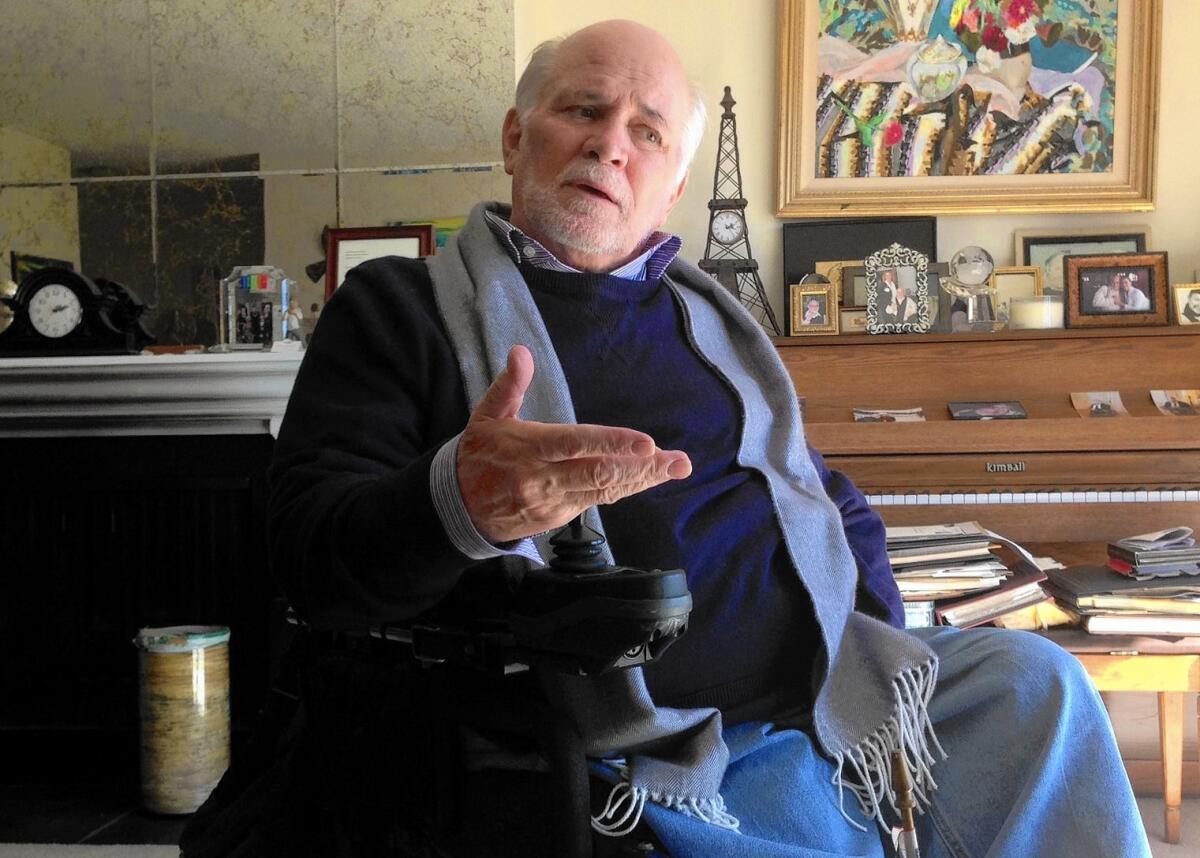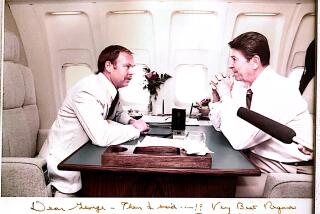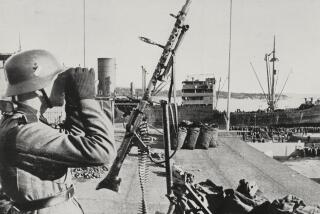Forty years after ‘Fourth of July,’ Ron Kovic still speaking up against war

In the fall of 1974, a tormented young Vietnam War veteran rolled his wheelchair into the Sears store on Colorado Avenue in Santa Monica and bought a typewriter for $42. He lugged it back to his apartment at Third and Pacific and began writing in a fever, index fingers stabbing the keys.
“I stayed up all night every night. Fifteen pages a day. …It just poured out of me.”
In one month, three weeks and two days, the decorated Marine, paralyzed from the chest down in 1968 by a bullet that tore through his spine, was done with the first draft of a coffee-stained, single-spaced manuscript that would become a classic antiwar anthem.
The title was “Born on the Fourth of July.”
“I was writing it as my last will and testament,” says Ron Kovic. “I was having heart palpitations, anxiety attacks, nightmares, and I didn’t think I was going to live to be 30.”
Forty years have vanished since he wrote that draft, and it has been 25 years since the release of the Oscar-winning Oliver Stone movie that was based on the book, with Tom Cruise playing Kovic.
And 10 years have gone by since I last visited Kovic. When I met with him, the death toll for American service members in Iraq had just reached 1,000, and he had studied the names and faces of every one of them, telling me we had not learned the lessons of Vietnam.
Since then, almost 6,000 more have died, the region is no more stable than it was when the wars began, and as Veterans Day approaches, the nation’s treatment of sick, injured and troubled veterans remains a source of national shame, as does the staggering number of homeless vets and the 20 or so daily suicides.
On Friday, the Obama administration announced that it was sending 1,500 more troops to Iraq.
“What we owe them more than anything is to respect them enough to not squander their lives in wars that make no sense,” Kovic said. “Yes, we need to be aware of dangers that beset our country around the world. But at the same time, if you can’t care for those who wear the uniform and serve and risk their lives, then what kind of country is this?”
Kovic, who lives in an apartment near the water in Redondo Beach, told me he had just read that more than 4,000 veterans are homeless in greater Los Angeles.
“It’s unconscionable and outrageous that so many of our veterans are sleeping on the streets or in front of the locked gate at the Westwood VA, when that land was granted for the use of veterans,” he said. “We’re pretty quick to send them out to war, but not motivated to care for them when they return.”
Last week the VA secretary announced that waiting times for primary-care appointments had dropped from 51 days to 42 days as of October, after scandalous reports of veterans dying while waiting for help and government falsification of reports to cover the depth of the ineptitude.
But despite improvements, the remaining problems are as unforgivable to Kovic today as they were in 1970, when the conditions at the Bronx VA hospital led to his awakening as both a peace activist and advocate for better healthcare.
“Life magazine did a report on my very ward in New York, depicting the slum-like conditions. There were men calling out for help that never came, and there were rats on the ward,” said Kovic, who went to war as a gung-ho Marine and was injured only after volunteering for a second tour of duty.
“And Kent State came along,” he said of the Ohio State National Guard shootings of unarmed antiwar demonstrators, “and not long after that I was speaking out against the war for the first time.”
And still doing so, reminding everyone that some wounds do not heal, preaching that violence begets violence, and that every conceivable alternative to war must be zealously pursued. Kovic is working on a sequel to “Born” because he believes he owes every citizen, veteran and military man and woman further reflection on the true meaning of valor, dissent and service to country.
“I’m less angry than I was in my 20s,” says Kovic. “I want to live, regardless of how much I’ve lost. I want to be productive, to contribute to society, to give back. I want to do more than simply receive a monthly disability check. I want to be part of life and know that I was more than just a victim in that war.”
He said he has forgiven whoever shot him, made peace with the government that sent him to war and with the VA, too, if only because forgiveness was the only way forward.
And yet he has conflicted feelings about Memorial Day and Veterans Day because they celebrate “a certain bravado without recognizing what happens to people when the bullets start flying.”
He’s coming up on 47 years in the wheelchair, Kovic said. If every day is a gift, every day also involves struggle and compromise, and something still smolders in him as it did on the day he wrote these words 40 years ago:
“I am the living death, the memorial day on wheels, I am your yankee doodle dandy, your john wayne come home, your fourth of july firecracker exploding in the grave.”
Kovic, who gets his healthcare at the Long Beach VA, told me a story about being asked to say a word to a hospitalized Iraq War vet there a few years ago.
Kovic wheeled over to the patient, who lay in a bed, and saw a long-ago version of himself.
The vet was young, paralyzed, dejected and afraid.
For all Kovic’s rage at the endless, enduring cost of war, he knew there was only one thing to say.
“I simply said, ‘Is there anything I can do to help you? What do you need, brother?’”
More to Read
Start your day right
Sign up for Essential California for news, features and recommendations from the L.A. Times and beyond in your inbox six days a week.
You may occasionally receive promotional content from the Los Angeles Times.







